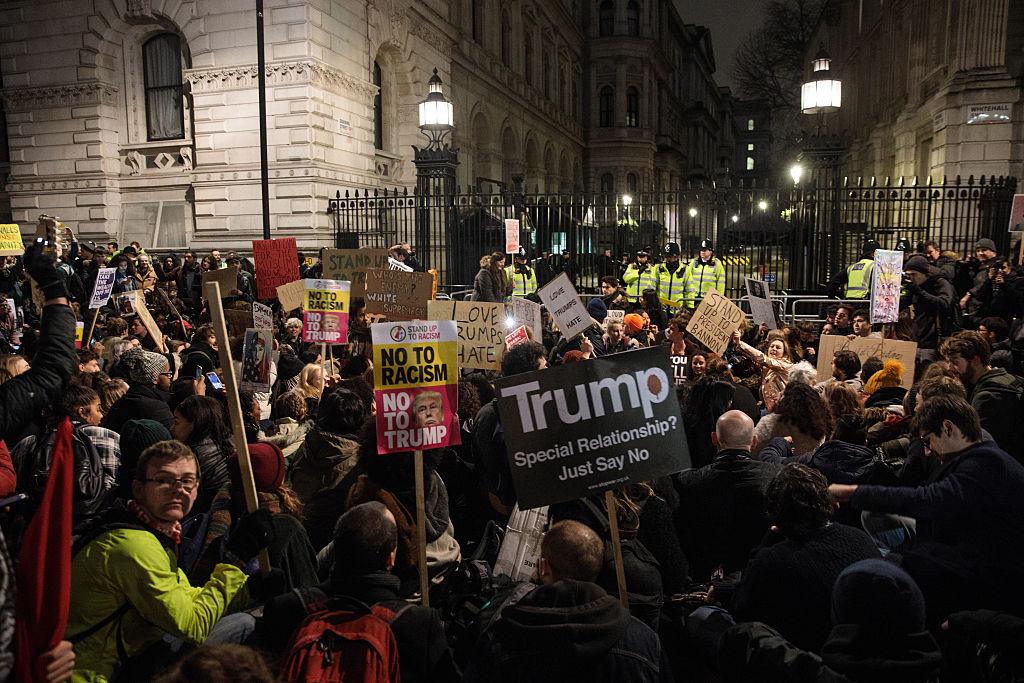Donald Trump's UK state visit will occur 'around June', London police chief says
Sir Bernard Hogan Howe says police expect ‘lots of protests’

Donald Trump’s planned state visit to the UK could happen “around June”, London police chief Sir Bernard Hogan Howe says.
The President’s potential visit to the UK, which will include an audience with the Queen, has provoked outrage after he signed an executive order temporarily banning people from seven Muslim-majority countries entering the US.
Nearly two million people signed a petition calling on Theresa May to cancel the visit in light of the “Muslim ban” which has lead to a Parliamentary debate on the matter which is due to take place on 20th February.
But it seems that planning for Mr Trump’s visit seems to be well underway as Sir Bernard told LBC’s Nick Ferrari that the London Metropolitan Police were expecting huge protests.
He said: “First of all, I think President Trump is coming around June, that’s the plan.
“At the moment, people are concerned there will be lots of protests. There have been protests already. We've had about 20,000 people about 10 days ago at Whitehall – all very peaceful.
“I’ve no doubt, as the days pass, we’ll make assessments on what's going to happen, so we can’t definitely say there will be huge amounts of problems.
“No doubt we’ll put a lot of officers out there and keep them safe and make sure everything goes well. If there is a few thousand officers, it’s likely to be quite a bit of money.”
Thousands marched on London last weekend as news of the ban – which also halted the US’s refugee programme – spread and reports emerged of people with valid visas and green cards already in transit when the order was signed being detained for hours at airport security.
The organisers of the protest said the ban was “an appalling attack on human rights” and that they wanted to send a message to Ms May that Mr Trump “was not welcome here”.
It followed another protest the week before where over a million women in the UK joined with millions of others around the world to march against Mr Trump’s inauguration and his anti-women comments and policies.
Unlike his predecessor Barack Obama, Mr Trump does not look set to address MPs in Westminster Hall following an intervention by Commons Speaker John Bercow.
Speaking in the House, Mr Bercow said he had been “strongly opposed” to Mr Trump even before the ban was announced because speaking in Westminster Hall was “an earned honour” rather than an “automatic right”.

If Mr Trump does make an address to Parliament it is likely to be in the Royal Gallery, in the House of Lords, rather than Westminster Hall.
The hall, which was built in the 11th century and is the oldest part of the Palace, has traditionally been reserved for foreign leaders who are deemed to be specially revered by the international community. Past speakers have included Mr Obama, Burmese leader Aung San Suu Kyi, Pope Benedict XVI and former South African Nelson Mandela.
Ms May announced that Mr Trump had been invited to the UK during her trip to the US at the end of last month.
The trip was viewed as a coup for the Prime Minister at the time as she was the first foreign leader to visit the new Commander in Chief since his inauguration on 20 January but it was quickly marred in controversy after Mr Trump signed the “Muslim ban” on the day she left.
Join our commenting forum
Join thought-provoking conversations, follow other Independent readers and see their replies
Comments